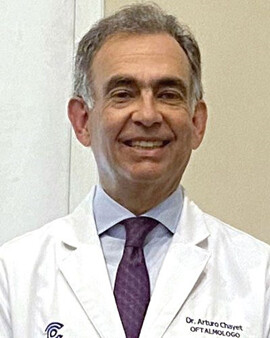Dr. Arturo Chayet: Transforming Ophthalmology practice with ANTERION® with swept-source OCT Technology

Image Curtesy: Creative Latin Media
This interview was originally conducted by Review of Ophthalmology.
In this interview Dr. Arturo Chayet shares his experience on the implementation of ANTERION® with swept-source OCT technology in his medical practice.
Dr. Arturo Chayet, renowned ophthalmologist and pioneer in cornea, cataract, and refractive surgery, sat down with Review of Ophthalmology to talk about his experience with the implementation of ANTERION® OCT technology. Dr. Chayet is the founder of CODET Vision Institute in Tijuana, Baja California, Mexico, and has performed more than 15,000 cataract surgeries in 2019, receiving international recognition of excellence in the field.
Review of Ophthalmology: Dr. Chayet, to begin with, could you give us a brief description of your distinguished career in the field of ophthalmology?
Dr. Chayet: Absolutely! I am an ophthalmic surgeon specializing in cornea, cataract, and refractive surgery. My career has unfolded at CODET Vision Institute in Tijuana, Mexico, where I also have the honor of being the Medical Director. I have been delivering high quality ophthalmic care for 35 years and focus on advancing the field of cataract, cornea, and refractive surgery.
Review of Ophthalmology: You have been a pioneer in laser vision correction and have performed thousands of cataract surgeries. What led you to invest in ANTERION® with swept-source OCT technology?
Dr. Chayet: I was looking for an upgrade in my methods and equipment, especially in intraocular lens calculation. At the time, I was using the IOL Master 500 for my calculations, but I was looking for a bridge to swept source OCT technology. We knew it was crucial to not only measure the axial length and various parameters of the eye, but also to understand the anterior segment anatomy including the effective lens position of intraocular lenses. I was struck by the capability of ANTERION® and was very impressed with the expertise Heidelberg Engineering has in the field. Additionally, our experience with SPECTRALIS® was excellent as well.
Review of Ophthalmology: What were the main advantages you noticed after implementing ANTERION® in your clinical practice?
Dr. Chayet: We immediately noticed significant improvements in our intraocular lens calculation results. Our spherical equivalent calculations went from a range of 80% to 84% -+0.50D to an impressive -+ 0.50D 95%.*
This aligns with the development of our Five Stars Surgeon software, which allows us to constantly analyze our results and improve our calculations. In addition, we started paying more attention to postoperative refractive astigmatism, and we are now above 85% in measurement accuracy. In other words, our intraocular lens surgery results over the past four years have improved dramatically.
Review of Ophthalmology: How has ANTERION® influenced your clinical workflow?
Dr. Chayet: Having everything in one device has almost certainly facilitated our workflow. The speed of measurements with the ANTERION swept-source OCT is impressive, which minimizes the effects of dry eye or poor tear quality. Our technicians are very happy with the ease of use and speedy results. In addition, swept-source OCT technology has better penetration through denser nuclei, allowing us to measure axial lengths that were previously only possible with ultrasound.
Review of Ophthalmology: How has the swept-source OCT technology changed your staff's perspective?
Dr. Chayet: The team prefers ANTERION® because it is fast and easy to use. For them, taking measurements is much more convenient, even with difficult patients. The technology has high penetration and has improved the quality of our measurements, which has also influenced our patients' satisfaction.
Review of Ophthalmology: What do you consider to be the main advantages of the ANTERION® for eye care professionals?
Dr. Chayet: The main advantages of ANTERION® are the accuracy in intraocular lens calculation, the ability to perform epithelial mapping1, and tracking of results. In addition, it allows us to be more accurate in postoperative follow-up of patients for refractive and corneal surgery, including vault measurements and treatment planning. This is the first All-in-One solution. I guess when Heidelberg Engineering set out to create an anterior segment OCT, they set out to create a device that would cater to all the anterior segment surgeon's needs.
Review of Ophthalmology: Dr. Chayet, your focus on innovation is evident. Could you tell us a little about your current research in the field of ophthalmology?
Dr. Chayet: We are currently conducting several studies, including research on cumulative and light-adjustable intraocular lenses. We are also exploring dentulous extraction with the Ziemer device.
[1] Epithelial map is not available for sale in the United States.
*Disclaimer: please note that clinical processes for cataract surgery and IOL power predictions must be optimized according to the specific biometer used.


